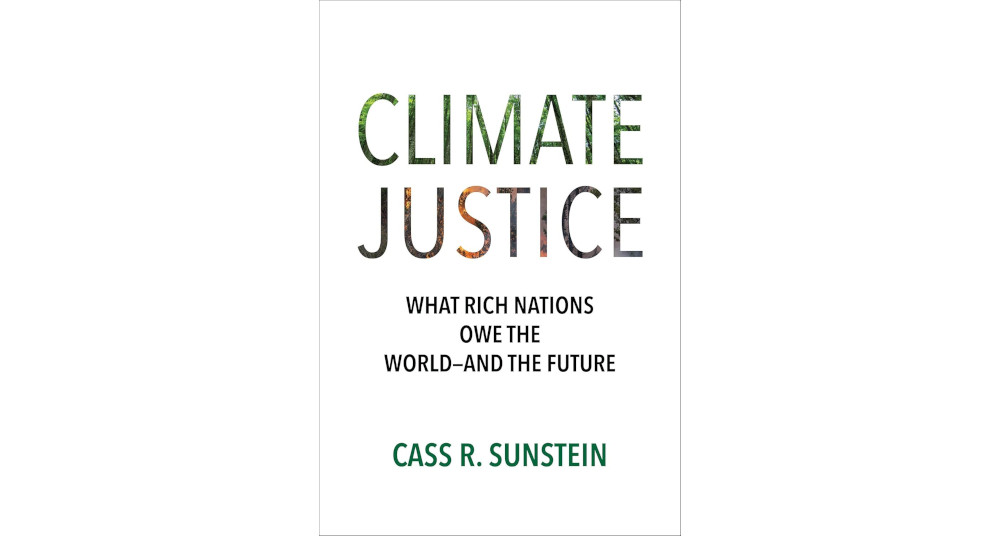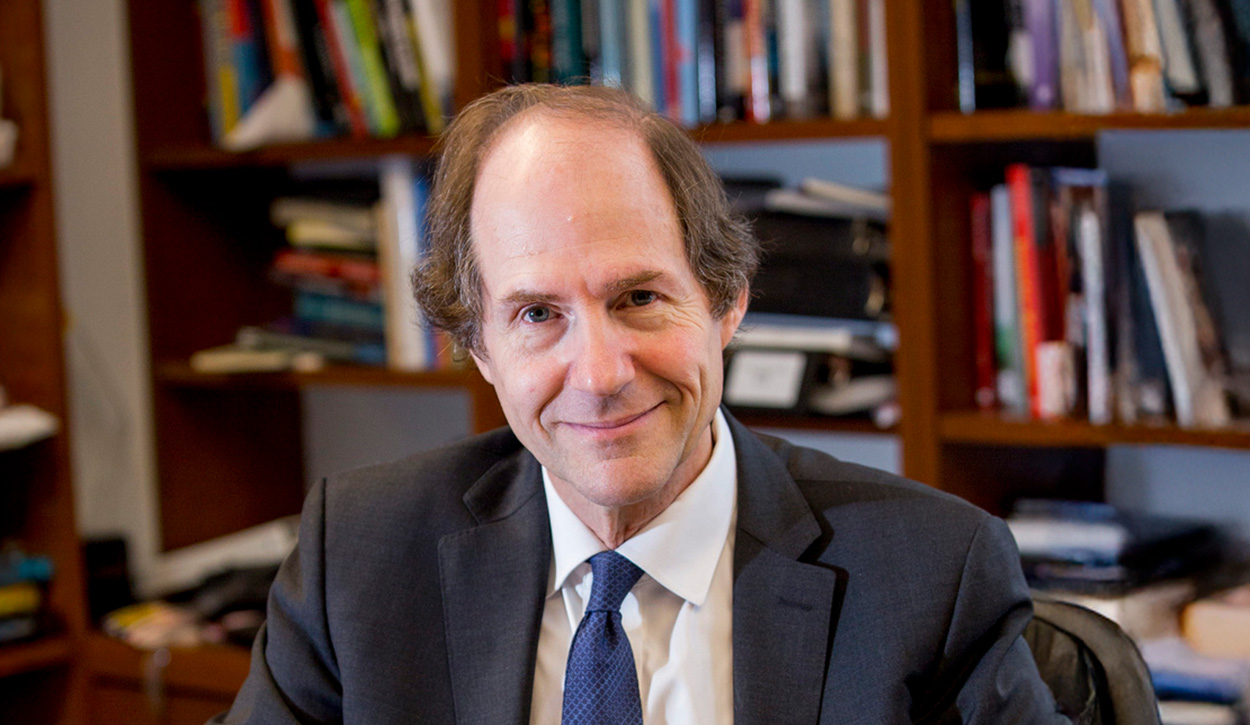I by IMD Book Club
Sustainability
Rethinking responsibility: Climate justice as a moral imperative and how businesses can respond
July 30, 2025 • by Julia Binder, Cass R. Sunstein in I by IMD Book Club
In his book Climate Justice: What Rich Nations Owe the World – and the Future, Cass R Sunstein delivers a timely exploration of the moral and practical obligations that wealthy nations have...
In his book Climate Justice: What Rich Nations Owe the World – and the Future, Cass R Sunstein delivers a timely exploration of the moral and practical obligations that wealthy nations have in the face of climate change. He discussed his views on climate, economics, innovation, and sports as well as the source of his optimism with Julia Binder, Professor of Sustainable Innovation and Business Transformation at IMD.
One of the best lawyers in my country's history was once asked: ‘How did you get so successful?’ And he said: ‘Here's what you have to do. First, you have to get people to want to agree with you. Then you have to show them how.'
Ten years after the signing of the Paris Agreement, the world seems to be veering away from the ideals of global cooperation that underpinned the landmark climate deal. Instead, under a second Trump administration, the United States has once again walked away from the agreement while also shuttering global aid in favor of a protectionist America-first approach.
So, it would seem like an odd time for Cass Sunstein, a prominent legal scholar and professor at Harvard University and the founder and director of the Program on Behavioral Economics and Public Policy at Harvard Law School, to write a book about social and environmental climate justice. But the issue at the heart of the book has been on his mind for nearly two decades, going back to the days when he served in the Obama Administration between 2009 and 2012.
Of course, he’s well aware that his arguments are landing at a complicated moment for the global climate movement, which he says is going in the wrong direction. He likened the timing of the publication to writing a celebration of folk music after Bob Dylan went electric. “As Galileo says: nonetheless, the argument is correct,” he quipped.

Yet Sunstein, a self-described optimist, sees lots of reasons for hope despite the current retreats on climate in the United States and elsewhere. He believes that countries and companies can make substantial progress on tackling the climate crisis and discussed tools and ideas on how that could be achieved.
“Economic growth and sustainability are looking more compatible than they ever have in human history,” he says.
“Compared to where we were in 2005, it’s really a miracle that we’ve seen so much,” he says, pointing to significant progress in wind, solar, and other renewable technologies. “Here are a couple other grounds for optimism: first, sustainability-focused innovation is accelerating rapidly. Second, the pace of advancement suggests even greater breakthroughs to come.”
Drawing on decades of expertise in law, behavioral science, and policy, Sunstein says there’s a compelling case for treating climate change not just as an environmental problem, but as a question of justice.
The core argument of his book is that wealthy nations have a moral and practical duty to address climate change globally and equitably. At the heart of this is a simple premise: lives matter equally – whether those lives are lived in rich or poor countries, or in this century or the next. From this moral foundation, Sunstein argues that the costs of carbon emissions should be calculated globally rather than nationally, as the harms from climate change disproportionately affect vulnerable populations.
If you're concerned about human life, you ought to want to address the climate change problem. Then the question is how. One of the great things I think about this domain of sustainability is that answers to the how question are numerous. Some of them are very ambitious and expensive, and some of them are not very expensive, and they might even save money. We need to have a repertoire of responses.
“The fundamental orientation of the book is provided by the idea of the social cost of carbon,” he said. “So, if you have a ton of carbon emissions, how much damage does it cause? That is a fundamental issue of law and policy in nations all over the world.”
He says that the damage caused by emitting a ton of carbon is higher for the world than it is for the high-income countries, such as the United States, France, or Germany, that emit a disproportionate share of it. US policy has wavered on this point. While it is retreating today, during the Obama administration, the “social cost of carbon” reflected global damages; then under the first Trump administration, it was limited to domestic impacts, drastically lowering its value. Under President Biden, the global perspective returned, and with it, a much higher valuation of emissions damages.
Sunstein is interested in how behavioral science – how nudges and “choice engines,” including emerging AI tools – can guide individuals and businesses toward lower-carbon decisions without heavy-handed mandates.
“One thing we noticed in the Obama administration was that many of our aggressive regulations to reduce greenhouse gas emissions also produced big benefits to consumers,” he said, citing higher fuel efficiency standards that saved consumers money over the lifetime of their vehicles and offered additional advantages, such as fewer trips to the gas station.
But he acknowledged the hazards of some of the language around green policies or nudges for consumers that can make them seem punitive or overly moralistic and can easily backfire. “We need much more creativity with respect to consumer choices,” he says.
This is where behavioral economics comes into play, he says, introducing the idea of the EAST Framework, which says that if you want to change behavior, you need to make it “easy, attractive, social, and timely.”
“I would also make it fun,” he says. “To have something be fun rather than condemning and reprimanding is a step forward.” (He acknowledged that it was often challenging to do – for instance, when trying to purchase a more energy-efficient refrigerator.)
I’m an optimist by nature. I follow Daniel Kahneman, the Nobel Prize-winning psychologist and one of the founders of behavioral economics, who said it's rational to be an optimist because if you're a pessimist, you suffer twice.
For companies, the issue is often as much a moral one as an economic one. But the two are not incompatible, and the past is full of examples of how dramatic changes in policies and corporate incentives can align to produce positive environmental outcomes. He pointed, for instance, to the impressive and “almost unbelievable” reductions in levels of lead, sulfur dioxide, particulate matter, nitrogen oxides, and other air pollutants over the last decades that were achieved in periods of impressive economic growth.
The secret behind these cuts was innovation. The picture in terms of greenhouse gases isn’t as good, but compared to business-as-usual trends, the last two decades have still seen very significant reductions in emissions.
Much more needs to be done, and he gave business leaders the following advice: “Within the next 60 days, adopt a social cost of carbon. It could be low, say €45. It could be high, let’s say €200. Adopt it, include it in your balance sheet, and commit to it publicly that this is what we’re going to do for the year 2026.”
This was a timely conversation, coming as the UN International Court of Justice issued a landmark opinion finding that any country’s violation of its legal climate obligations could be a “wrongful act” that could lead to reparations to the most affected countries.
“Any statement by an international body that is emphatic on the magnitude of the climate problem, and that is emphatic on the existence of issues of justice, matters,” he said. But he was cautious about just how much it would matter, quoting an American baseball player from the 1950s, Yogi Berra, who once said, “It’s tough to make predictions, especially about the future.”
Authors

Julia Binder
Professor of Business Transformation at IMD
Julia Katharina Binder, Professor of Business Transformation, is a renowned thought leader recognized on the 2022 Thinkers50 Radar list for her work at the intersection of sustainability and innovation. As Director of IMD’s Center for Sustainable and Inclusive Business, Binder is dedicated to leveraging IMD’s diverse expertise on sustainability topics to guide business leaders in discovering innovative solutions to contemporary challenges. At IMD, Binder serves as Program Director for Creating Value in the Circular Economy and teaches in key open programs including Transition to Business Leadership (TBL), and Leading Sustainable Business Transformation (LSBT). She is involved in the school’s EMBA and MBA programs, and contributes to IMD’s custom programs, crafting transformative learning journeys for clients globally.

Cass R. Sunstein
Robert Walmsley University Professor at Harvard University
Cass R. Sunstein is the Robert Walmsley University Professor at Harvard and founder of the Program on Behavioral Economics and Public Policy at Harvard Law School. A recipient of the 2018 Holberg Prize, he has advised global institutions including the WHO, UN, and World Bank. He served in the Obama and Biden administrations, most recently as Senior Counselor at the Department of Homeland Security. A prolific author, his works include Nudge and How Change Happens, and Climate Justice: What Rich Nations Owe the World-and the Future. In 2024, he received the Distinguished Public Service Medal for his work on climate resilience and reducing administrative burdens.
